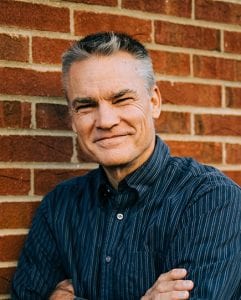The freedom of forgiveness
September 12, 2024By Jeff Becraft
Just yesterday, I was reviewing a document and I discovered that there was a major error in it. The problem is, it had already been sent to the printer and it had already been printed… and some of them had already been mailed out.
It was my responsibility to do the final proof, which I did while we were in Texas visiting grandkids. And I did it in a hurry. (This is what happens when you don’t have enough margin in your life.) And I did it on my phone (another reason why I don’t like doing things on my phone). I totally missed that there was a third and fourth panel to this document. I quickly scanned the first two panels, approved it, and off it went to the printer,
I didn’t discover the mistake until yesterday. On the third or fourth panel was the wrong list of the Board of Directors. It was an old list.
My heart sank.
I sat there in kind of dismay for about 30 seconds, and then decided I just simply needed to take ownership of it. It was my fault. I was the one who proofed it and gave the okay. I sent out an apology to the Board but I personally called a brand new Board member who had recently joined our team. Her name was not on that list. We talked about a lot of things on the phone dealing with Our Place of Hope and then I finally said, “Well, that’s not really why I’m calling. I’m calling to apologize.” I began telling her the details of the problem and my apology and in the midst of that, Melanie interjected and said, “I forgive you.”
What significant and healing words.
Another phrase for forgiveness is “bearing the cost” (this is something I learned from a book called Hinds Feet on High Places, one of the top five books that have influenced my life). In other words, when we forgive someone, we’re bearing the cost of their actions, whatever problems they caused us, whatever pain, whatever hurt, whatever disappointment. We’re bearing that cost, and we are saying, “I’m not going to hold this against you.” So, forgiveness is costly.
But it is also freeing
One of my wife’s and mine heroes is Corrie Ten Boom. I have spoken of her before. Corrie and her family endured the cruelty and horrors of being sent to Nazi prison camp. All of Corrie’s family died at the hands of the Nazis. Corrie was miraculously released one week before her number was to be extinguished.
After the war, Corrie started a home to help people who had suffered what she had suffered. One of the things that she noted was that the people who forgave found healing and were able to go on with hope in their lives. She also noted that those that did not forgive never did heal and seemed to be trapped in a dark valley.
A lot of times in a situation, we’ll simply say, “That’s okay.” But sometimes it is not okay. Sometimes what has happened is inexcusable. But as C.S. Lewis points out, that’s what forgiveness is all about. If it’s excusable, you really don’t need to forgive anything. Forgiveness forgives the inexcusable. And I think one of the reasons that people don’t forgive or hesitate to forgive is because they think that by forgiving the person they are saying that what they did was okay.
That is not what forgiveness is.
If a person does someone wrong, that’s wrong and there’s hurt and pain and complications associated with that. But in forgiveness, we’re not saying that what the person did is okay or alright; what we’re saying is, I’m not going to hold it against you.
When we walk around with resentment and bitterness and unforgiveness, let’s ask ourselves: are we really happy during those times? Or are we just simply walking around with a scowl on our face and the tapes are just running in the back of our minds over and over and over again about how wrong it is what the other person did? Well, that is not freedom.
One of the things that forgiveness does is that it sets us free. I’ve heard it said that to hold on to resentment and bitterness is like drinking poison and hoping that the other person dies.
Forgiveness is not a feeling… it is a choice.
What Melanie said was healing. There are a lot bigger things in life than my blunder that have a lot more serious consequences, but the principle is the same – forgiveness sets us free.
Jeff Becraft is the Director of Our Place of Hope and the Director Emeritus for Youth Corps and has dedicated much of his life to helping shift the vision of people’s lives. Our Place of Hope is a paradigm shift for people living with mental illness that encourages them to regain meaning, purpose, and hope for their lives. You can connect with Jeff at [email protected].






















